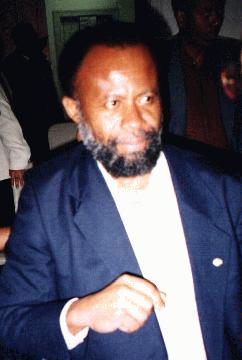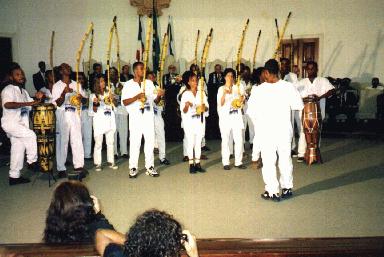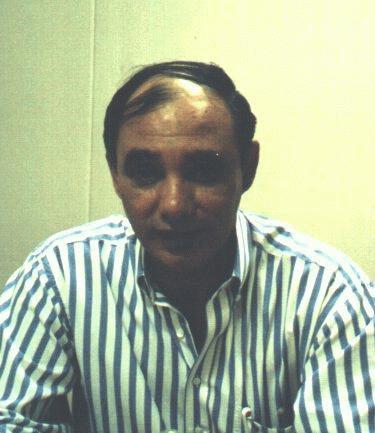OPENING CEREMONY OF 5TH
AFRO-BRAZILIAN CONGRESS
SALVADOR DA BAHIA
AUGUST 17, 1997

 As a military band played Brazil's operatic-sounding national
anthem, the Federal University of Bahia opened the 5th Afro-Brazilian Congress.
Clearly the intention was for it to be a high-brow affair and on the diaz
were the governor of Bahia, the mayor of Salvador and the city council
President. What struck you right away was that in this state and city,
both said to be about 80% black, each of those high officials was white.
To bring some color to the head table, the University brought the Angolan
ambassador up from Brasilia. And then there was Luiz Alberto, Salvador's
newly-elected black Congressman, who has become a symbol of change in Brazil.
As a military band played Brazil's operatic-sounding national
anthem, the Federal University of Bahia opened the 5th Afro-Brazilian Congress.
Clearly the intention was for it to be a high-brow affair and on the diaz
were the governor of Bahia, the mayor of Salvador and the city council
President. What struck you right away was that in this state and city,
both said to be about 80% black, each of those high officials was white.
To bring some color to the head table, the University brought the Angolan
ambassador up from Brasilia. And then there was Luiz Alberto, Salvador's
newly-elected black Congressman, who has become a symbol of change in Brazil.
 Luiz Alberto, Deputy in Brazilian Federal Government
Leader of MNU or Unified Negro Movement
Luiz Alberto, Deputy in Brazilian Federal Government
Leader of MNU or Unified Negro Movement
When Luiz Alberto rose to speak, he quickly made clear
it would not be a polite conversation.
"More than ever," he said, "Salvador is the
black capital of Brazil." Yet Alberto complained that the 80% of Salvador's
population that is black finds itself in the gravest position in the world.
Blacks are under-employed, excluded socially in their own Salvador, and
worse, he said, they are victims of police torture and a policy of violence
against black people.
It was the latter statement about the
police, which brought much of the audience to it's feet.
Critics say Brazil's black self-hatred is crystalized in Salvador's ovewhelming
black police force which protects a rich white minority from a poor black
majority by intimidating and killing black people with impunity.
 OVERFLOW CROWD AT OPENING
The white officials on the diaz, looked uncomfortable
as Alberto continued what some described as his "polemics." When
the city council president spoke for the officials of the state and city
he urged all to celebrate the uniqueness of Bahia, it's traditions
and friendly relations between blacks and whites. And certainly there
was no question of his legitimacy as office holder in this predominately
black city. He and the others were elected by the black majority.
Voting is compulsory in Brazil. And blacks overwhelming chose white candidates
over black ones.
OVERFLOW CROWD AT OPENING
The white officials on the diaz, looked uncomfortable
as Alberto continued what some described as his "polemics." When
the city council president spoke for the officials of the state and city
he urged all to celebrate the uniqueness of Bahia, it's traditions
and friendly relations between blacks and whites. And certainly there
was no question of his legitimacy as office holder in this predominately
black city. He and the others were elected by the black majority.
Voting is compulsory in Brazil. And blacks overwhelming chose white candidates
over black ones.
After the poltics, the ceremony turned to culture.
There were standing ovations for the high priest and priestesses of the
African-based Candomble, a religion that is respcted if not practiced by
both blacks and whites in Bahia.
A capoeira group played their drums and berimbaus...and
a Carnaval group, the "Sons of Ghandi" performed.


CAPOEIRISTAS PLAY BERIMBAUS
"FILHOS DE GHANDI"
The chairman of the Congress, Jeferson Barcelar--head
of the University's Center of African and Asians Studies--said this 5th
Congress was being run by blacks, unlike the ones held in the 1930s,
but he was unwilling to say that the black population of Brazil is better
off today than it was then:
 Jeferson
Barcelar, Congress Chairman
Jeferson
Barcelar, Congress Chairman
"The negro still lives in the worst conditions,
still is discriminated against, and to be black still means to be valued
less within Brazilian society."





 Luiz Alberto, Deputy in Brazilian Federal Government
Leader of MNU or Unified Negro Movement
Luiz Alberto, Deputy in Brazilian Federal Government
Leader of MNU or Unified Negro Movement



 Jeferson
Barcelar, Congress Chairman
Jeferson
Barcelar, Congress Chairman